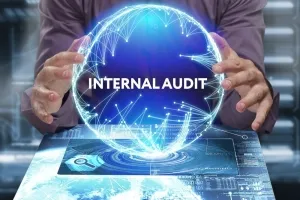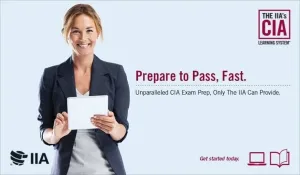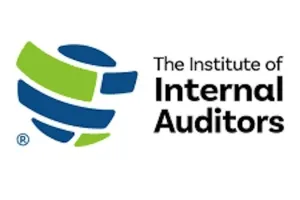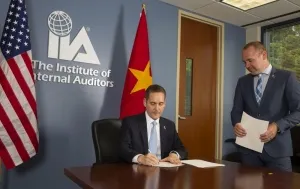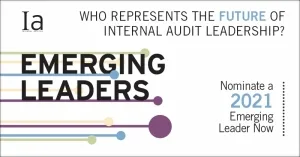عرض العناصر حسب علامة : معهد المدققين الداخليين الدولي IIA
كيفية استخدام التكنولوجيا لتنمية قيمتك كمدقق داخلي
في هذه الندوة عبر الإنترنت، بالتعاون مع Crowe سنكتشف الطرق القوية التي يمكنك من خلالها الاستفادة من البيانات والتكنولوجيا لزيادة القيمة الخاصة بك بشكل أكبر.
معلومات إضافية
- البلد عالمي
- نوع الفعالية برسوم
- بداية الفعالية الثلاثاء, 24 أكتوبر 2023
- نهاية الفعالية الثلاثاء, 24 أكتوبر 2023
- التخصص مراجعة داخلية
- مكان الفعالية أون لاين
كيفية اجتياز اختبار شهادة مدقق داخلي معتمد
يقدم معهد المدققين الداخليين الدولي للأعضاء خصمًا بنسبة 20٪ على رسوم التسجيل والامتحان
يقدم معهد المدققين الداخليين لأعضاء المعهد خصمًا بنسبة 20٪ على رسوم التسجيل والامتحان الجديد للمدقق الداخلي المعتمد (CIA) أو شهادة ضمان إدارة المخاطر (CRMA) في مايو.
تلعب مجالس الإدارة دورًا هامًا في الحوكمة في تعزيز الثقة في إعداد تقارير الشركات المتكاملة
تم اعتماد التقارير المتكاملة كمبادرة يقودها السوق من قبل الآلاف من مؤسسات القطاعين الخاص والعام في جميع أنحاء العالم لمساعدتهم على فهم وإيصال خلق القيمة والأداء للمستثمرين وأصحاب المصلحة الآخرين.
معلومات إضافية
-
المحتوى بالإنجليزية
Boards of Directors have a critical governance role in enhancing confidence in integrated corporate reporting
IFAC releases second installment of integrated reporting assurance series
Integrated reporting has been adopted as a market-led initiative by thousands of private and public sector organizations around the world to help them understand and communicate their value creation and performance to investors and other stakeholders.
To enhance trust in integrated corporate reporting, boards need to oversee the integrity of the integrated report and underlying reporting process. To help them, IFAC has worked in partnership with the Institute of Internal Auditors (IIA) to develop Executing the Board’s Governance Responsibility for Integrated Reporting—the second installment in IFAC’s integrated reporting assurance series. It highlights how boards execute their accountability responsibility for integrated reporting and integrated reports with the coordination of all lines of governance and the support of internal auditors.
Board responsibility statements incorporate multiple internal assurance activities across all lines of governance and management and support the integrity of the integrated report and the underlying processes, systems, and information. This installment highlights the concepts and tools needed to deliver such statements. These can also be applied to regulated forms of management commentary in many parts of the world, including management discussion and analysis, strategic report, operating and financial review or the Task Force on Climate-Related Financial Disclosures.
“The IFRS Foundation’s announcement on the future of integrated reporting and the International Integrated ReportingFramework confirms that the International Accounting Standards Board (IASB) and International Sustainability Standards Board (ISSB) will assume responsibility for the Framework from July,” said Kevin Dancey, IFAC CEO. “Within the IFRS Foundation, the Framework will be further developed to help companies prepare an integrated report and support connectivity between the reporting required by the IASB and the ISSB. This installment of IFAC’s integrated reporting assurance series shows how directors can deliver confidence in integrated reporting through coordinated and connected internal and external assurance activities.”
“As an integral component of effective organizational governance, internal audit plays a critical role in instilling trust and confidence in the completeness, accuracy, and reliability of the information that forms the basis of the organization’s integrated report,” said Anthony Pugliese, CIA, CPA, CGMA, CITP, president and CEO of The IIA. “As noted in the widely accepted Three Lines Model, internal audit provides objective assurance, independent from management, of internal controls critical to achieving organizational objectives, including objectives related to integrated thinking and reporting.”
يتلقى أعضاء معهد المدققين الداخليين (IIA) خصمًا بنسبة 20٪ على رسوم التسجيل والامتحان من CIA أو CRMA
يقدم معهد المدققين الداخليين لأعضاء المعهد خصمًا بنسبة 20٪ على رسوم التسجيل والامتحان الجديدة الخاصة بالمدقق الداخلي المعتمد (CIA) أو شهادة ضمان إدارة المخاطر (CRMA) في مايو.
معلومات إضافية
-
المحتوى بالإنجليزية
IIA Members Receive 20% Off CIA or CRMA Application and Exam Registration Fees
The Institute of Internal Auditors is offering IIA members a 20% discount on new application and exam registration fees for the Certified Internal Auditor® (CIA®) or Certification in Risk Management Assurance® (CRMA®) in May.
Earning a professional credential is essential to be distinguished from your peers. Wherever your journey takes you, earning the CIA credential, followed by the CRMA, can certify your success.
Join The IIA now through 31 May to receive a 20% discount on CIA or CRMA application and exam registration fees. Once a member, you can save even more on exam prep!
That’s right, The IIA is offering members 20% off select products and services, like The IIA’s CIA Learning System® study materials, throughout May.
Learn more about the CIA and CRMA programs and plan to take advantage of the savings by 31 May.
تركيز المدققين على المخاطر البيئية والاجتماعية وحوكمة الشركات
معلومات إضافية
-
المحتوى بالإنجليزية
Auditors focusing more on ESG risks
As companies come under increasing pressure to deal with climate change and diversity, their internal auditors are putting more emphasis on making sure environmental, social and governance reports are reliable.
A new report released Wednesday by the Institute of Internal Auditors explains some of the challenges involved with providing assurance on ESG and sustainability reports and understanding the risks of climate change and lack of diversity for a company’s operations.
More organizations are facing pressure from environmental groups, activist shareholders and asset managers to make public commitments to sustainability and provide regular updates on their ESG strategies, goals and measurements, while making sure they’re accurate and relevant. However, the report points out that ESG reporting is still at an immature stage, and there’s no single authoritative set of standards for what should be reported, although a number of groups have been moving in recent months to align their standards and frameworks. The internal audit function can help management by providing assurance, insights and advice on ESG matters, as some outside auditing firms like the Big Four have also begun to do.
IIA president and CEO Anthony J. Pugliese (left) signs memorandum of understanding with IIA director of strategic global initiatives Greg van Choyke.Courtesy of IIA
The IIA is looking at ESG through the filter of its Three Lines of Defense model. “It’s the role of governance at the board, and then the role of management to make sure these things are being prioritized in terms of these models and frameworks, and then internal audit is in a very valuable position,” said IIA president and CEO Anthony Pugliese. “It’s probably one of the few enterprise functions that can actually look at how risks are identified, how the controls are put into place whether you’re using something like a COSO model, and then reporting back, whether it’s in a consultative or an assurance way to governance and management as to the effectiveness of all of it.”
Some internal audit departments are helping corporate management determine which ESG risks should be a particular focus, and that will often vary by industry. “Management takes responsibility for that, but we’re seeing a lot of activity on that front across the board,” said Pugliese.
ESG standard-setters have been coming under pressure from financial regulators to harmonize their standards and frameworks so investors can rely more on the reports. The Sustainability Accounting Standards Board and the International Integrated Reporting Council have announced plans to merge together later this year to form a group called the Value Reporting Foundation. They have begun working with the Global Reporting Initiative, the Climate Disclosure Standards Board and the Carbon Disclosure Project to align their standards. Meanwhile, the International Financial Reporting Standards Foundation is also preparing to set up a proposed International Sustainability Standards Board that it would oversee alongside the International Accounting Standards Board, with input from the existing ESG standard-setters, and it’s in the process of looking for a chair and vice-chair to run the board (see story).
“The real question right now is which one do we use and how do we do it?” said Pugliese. “It’s almost entirely nonfinancial. There are a lot of questions on how to do it, and there’s further consolidation taking place in a space where standards are being set on these topics, and identifying which ones are important.”
The IIA is a member of the IIRC and recently wrote a letter to the Securities and Exchange Commission, which has been asking for comments about ESG disclosures. In its letter, the IIA called for uniform climate disclosure by corporations and recognition of the role played by internal auditors in providing assurance around accurate, reliable information.
Increasingly, in response to the Black Lives Matter protests last year, companies are focusing more on diversity, which fits into the social part of ESG reporting. ESG standard-setters generally haven’t developed standards for that as much as their environmental standards, perhaps out of fear of being accused of setting up racial quotas.
“There are some concepts that have not yet found their way into standards yet, like diversity, equity and inclusion,” said Pugliese. “How do you measure that? It’s such a subjective term. Companies are looking for ways to report on it. You’ve got big investment management firms like BlackRock who are talking about it a lot, and companies are struggling with what they need to produce and monitor. You certainly don’t want DE&I to be a kind of checklist for saying, ‘Yeah, we’ve hired all the right people,’ and this is a thing that’s done. It’s a lot more detailed than that and subjective. They’re turning to internal audit to assist in that. We’re seeing things like culture audits beginning to happen to make sure things like DE&I are firmly embedded in culture so companies can report on that. It’s becoming a more prevalent topic, and that’s just one part of the overall ESG spectrum.”
The IIA plans to continue working on ESG issues with the IIRC as well as the International Federation of Accountants and other global groups that have long been involved with ESG reporting, whose urgency has been given greater impetus by climate change, racial protests and the pandemic.
“It’s not like the Wild, Wild West,” said Pugliese. “It’s been around for a while around the world. But these things get triggered by something like what happened last year, and all of a sudden they’re just being propelled forward at lightspeed. We want to make sure there are no adverse effects so companies can be ready to do this work. We’re keeping an eye on it for sure and want to be part of these new groups and the calls for members to be in these groups.”
تعليقات معهد المدققين الداخليين إلى لجنة الأوراق المالية والبورصات على الإفصاح عن تغير المناخ
انضم إلى IIA في معالجة قضايا ESG على المستوى العالمي والدعوة إلى تأكيد داخلي مستقل من خلال دعوة SEC في إنشاء إطار إفصاح واحد للإفصاح عن تغير المناخ
معلومات إضافية
-
المحتوى بالإنجليزية
IIA Comments to SEC on Climate Change Disclosure
Support greater attention on the important issue of sustainability, The Institute of Internal Auditors (IIA) on Friday delivered a message to U.S. Securities and Exchange Commission Chair Gary Gensler, encouraging uniform climate disclosure by corporations and recognition of the role internal audit plays in providing assurance around complete, accurate, and reliable information.
The IIA, a member of the International Integrated Reporting Council, is committed to addressing environmental, social and governance (ESG) issues on a global level and advocating for independent internal assurance. Internal audit, because of its holistic understanding of risks, is uniquely positioned to provide assurance on effective governance structures and systems of internal controls.
“Business performance is no longer judged purely on short-term financial returns. ESG issues represent a broad range of risks, including to external supply chains, internal operations, third parties, general control weaknesses, data accuracy, human capital, and more,” writes IIA President and CEO Anthony J. Pugliese, CPA, CGMA, CITP. “A single system of climate disclosures would provide an opportunity for comparability among corporations and investors and allow for more informed business decisions that consider ESG impacts. This also would enable long-term organizational resilience.”
Pugliese said internal audit, because of its holistic understanding of risks, is crucial to reliable and accurate disclosures and “would provide objective assurance, independent from management, that established control activities are properly designed and operating effectively, thus providing confidence and trust to stakeholders.”
“Listed companies that publish climate-related disclosures,” he said, “should acknowledge to shareholders whether they have an internal audit function that is sufficiently independent from management. This would contribute to confidence in the markets.”
Read the complete letter to SEC Chair Gary Gensler
ما الذي يميز المدقق الداخلي الاستثنائي ومن يمثل مستقبل المهنة؟
معلومات إضافية
-
المحتوى بالإنجليزية
Internal Auditor's Emerging Leaders
What defines an extraordinary internal auditor, and who represents the future of the profession?
The search for tomorrow’s internal audit leaders is on. Internal Auditor magazine will recognize up-and-coming internal audit professionals in its October 2021 issue. What defines an extraordinary internal auditor? Innovation, integrity, business acumen, passion? Do you know a high-performing internal auditor who possesses the qualities to become a thought leader in the industry?
Nominees must be members of The IIA and have, or be working toward, The IIA’s Certified Internal Auditor® (CIA®) certification. The magazine will not feature more than one emerging leader from the same company. Self nominations will not be accepted. All nominees must be age 30 or younger as of Dec. 31, 2021.
Nominators will be asked to fill out a brief questionnaire and provide statements about their nominee’s performance in the areas of business acumen/leadership, service to the profession, community service, and innovative thinking.
All nomination material becomes the property of Internal Auditor magazine. By submitting a nomination, you grant The IIA a license to publish the nomination material in Internal Auditor magazine. Those chosen as emerging leaders will be interviewed for the article. By agreeing to be interviewed, nominees grant The IIA permission to use their quotes in other materials. The emerging leaders will be asked to participate in various IIA initiatives throughout the following year to help bring forth the voice of The IIA's young professionals.
Nominations are open April 1 through May 14, 2021
معهد المدققين الداخليين يحتاجك!
رشح الآن لدعوة للمتطوعين للفترة 2022-2023.
معلومات إضافية
-
المحتوى بالإنجليزية
IIA Volunteer Nominations
Volunteer Opportunities
Volunteer Opportunities | Committees | Volunteer Leadership | Nominate Now | FAQ
Volunteers are the heart of The IIA’s success by helping to identify trends, programs, and services to ensure that The IIA continues to guide the profession into the future. They also assist in the development of tools and providing support to IIA members, chapters, and affiliates to enhance the practice of internal auditing and raise the visibility of the profession with stakeholders. With every volunteer, The IIA grows more energized, more diverse and inclusive, and better equipped to reach our common goals.
Get Involved
Flexible Commitments
The IIA has created flexible commitment opportunities through global professional knowledge groups that allow you to share your expertise, skills, and time on a project-by-project basis in your area(s) of interest. We strongly believe that involving more members in volunteer opportunities creates a critical diversity of opinions and experiences, expands the leadership pipeline, and influences content being developed by peers for peers.
Find out how to view opportunities or add your name as a resource to help The IIA identify opportunities that match your interests and qualifications. Staff leads will review your application and invite you to participate as matches are identified. To be responsive to current and emerging issues, requests for volunteer engagement on a per-project basis is open throughout the year and is not part of the annual nominations process.
Volunteer Engagement With Longer-term Commitments
The primary function of IIA volunteer engagement is to provide subject matter expertise, advice, and counsel on an ongoing basis in different aspects of organizational operations. Learn more.
Volunteer Leadership
The IIA provides dynamic leadership for the global profession of internal auditing. Volunteers play a key role and the contributions they make impact the day-to-day functions of internal auditors, as well as shape the future of the internal audit profession. Learn more.
Nominate Now
2022–23 Volunteer Organizational Chart
المدققون الداخليون يتجهون نحو السحابة
يعتزم ما يقرب من ربع فرق التدقيق الداخلي تنفيذ إدارة التدقيق المستندة إلى السحابة أو برامج الحوكمة والمخاطر والامتثال هذا العام، وفقًا لمسح جديد.
معلومات إضافية
-
المحتوى بالإنجليزية
Nearly a quarter of internal audit teams intend to implement cloud-based audit management or governance, risk and compliance software this year, according to a new survey.
The report, by the Institute of Internal Auditors’ Internal Audit Foundation and the audit, risk and compliance software developer AuditBoard, surveyed 134 internal audit leaders and found that 22 percent of the respondents indicated they intend to implement cloud-based technology this year, resulting in a majority of internal audit teams using a cloud-based audit management or GRC software for the first time.
The findings come as more auditors implement cloud-based technology, especially during the pandemic when many organizations have shifted much of their workforce to remote work from home arrangements. Hesitancy over adoption of cloud technology is giving way to practical necessity.
“While automation of administrative functions offers clear and immediate benefits, internal audit is discovering the technology’s potential to drive departmental and business value,” said IIA COO William Michalisin in a statement last month. “This survey shows a positive step forward, with 22 percent of respondents saying they plan to implement cloud-based technology this year. As this report suggests, technology doesn’t merely complement the internal audit function, it’s crucial to more effective practices, allowing us to focus where it matters most and to elevate our value to stakeholders.”
Managing Your Firm in a Post-COVID World
Think beyond the pandemic with exclusive resources to help you build a thriving virtual practice.
SPONSORED BY INTUIT ACCOUNTANTS
Plans for greater use of cloud technology indicates that internal audit departments are moving nearer to the cloud technology adoption rates of other business functions like the IT department. Internal auditors cited a number of challenges they encountered last year. A 52 percent majority of the respondents said identifying and evaluating new and emerging risks was their top challenge in 2020, while 43 percent cited the need to collaborate remotely with internal and external audit stakeholders. Communication and follow-up with business owners was considered a top concern by 38 percent of the internal auditors who responded to the survey.
The top uses for audit management software cited by the survey respondents were document management, issue and action plan management, and testing and work reviews. One respondent indicated that internal auditors have more time for strategic activities when their administrative activities are automated.
“Many internal audit teams that have not yet shifted to a cloud approach are now set to reap the benefits of modernization — including gaining greater bandwidth for strategic, value-add activities — and will be better positioned to protect their organizations from new and emerging risks,” said AuditBoard chief marketing officer John Reese in a statement. “They'll also get to equal footing with other functions within their organization who have already made the move to cloud-based solutions.”
The report points to some of the advantages of cloud-based solutions compared to other technologies in that they are often more secure than manual solutions and are easier to implement and administer than on-premise systems. Cloud-based systems are typically offered as a service, reducing the cost of maintenance and offering increasing value over time, as new features and improvements are added to benefit older and newer customers. Cloud-based investments are considered operational expenses, which are often favored by CFOs and may have a streamlined purchase process compared to on-premise investments, which are considered capital expenses, often subject to extra scrutiny. When choosing which approach to take, chief audit executives should familiarize themselves with the organization’s operational expense and capital expense approval processes, the report advises.
Separately, former IIA president and CEO Richard Chambers, who recently left the IIA after running the organization for 12 years, has joined the board of SWAP Internal Audit Services, a company in the U.K., as its first independent non-executive director, starting April 1. He also recently formed his own firm, Richard F. Chambers and Associates LLC, with the mission of informing and inspiring internal auditors and illuminating the potential of the profession globally.

